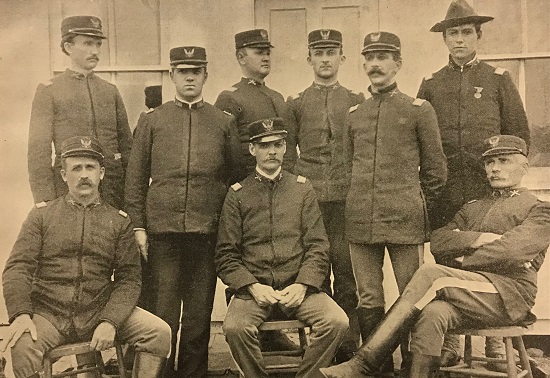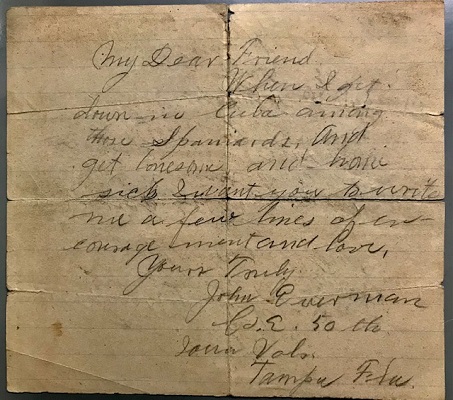
A Brief History of the 50th Iowa Volunteer
Infantry
By Patrick McSherry
Please Visit our Home
Page to learn more about the Spanish American
War

The Field and Staff officers of
the 50th Iowa Volunteer Infantry
General:
The
50st Iowa Volunteer Infantry served its term of service within the
continental U.S.
Unit History:
The
Fiftieth Iowa Volunteer Infantry was mustered into service from May 17
to 18, 1898 in Des Moines, Iowa. At the time of mustering in the
regiment consisted of fifty officers and 751 enlisted men under the
command of Colonel Douglass V. Jackson. The core of the regiment
consisted of troops from the 2nd Iowa National Guard with additional
troops being recruited to bring the regiment up to the required
strength.
In
Des Moines, the men were encamped at Camp McKinley. The regiment had
orders to proceed to Florida on May 21. On the eve of their departure
there was a tremendous excitement in the camp, but it was not caused by
the impending departure. A gambler had entered camp and took advantage
of several men in a crap game by using loaded dice. This was found out
and an estimated five hundred men chased the man from camp. The man was
beaten several times before some officers stopped the mob. One officer
chased the man and force him to surrender the trick dice. The gambler
was then allowed to move on…but not before a small group of men from
camp again found him and gave him yet another beating.
The
regiment departed for Tampa, Florida the following day aboard the
Wabash, Rock Island and Northwest railway, with the men entraining at
the Rock Island Fair Grounds train station. While it was en-route to
Tampa, orders were received ending the regiment to Jacksonville’s Camp
Cuba Libre. This was a new camp, and that at Tampa was
already overcrowded. The regiment arrived at Camp
Cuba Libre on May 24, and was assigned to the
Second Brigade, Second Division of the Seventh Army Corps. Col. Jackson
commanded the brigade, which also included the First
Wisconsin Volunteer Infantry.

The letter above was written by John F.
Everman of the 50th Iowa.
Everman was born on December 2,
1877 at Centerville, Iowa. After the war, Everman, a
carpenter by trade, moved to Illinois. He
was granted a pension in 1899 and eventually
married Johanna Bryant. Everman died on November 2, 1941
at Maywood, Illinois, outliving Johanna by about a year
and a half. This note was
apparently written as the regiment was en-route to Tampa. The regiment
was diverted to Jacksonville en-route and never actually
arrived at Tampa, which is why Tampa is listed in the note
in spite of the regiment never going there.
He may have been feeling a bit homesick and concerned about what
he may have gotten himself into. He likely gave copies of this
note to various friends asking them to write to him. He must have
done this on the spur of the moment since he neglected to tell
people how to contact him. The letter reads:
"My Dear friend When I get down
-- Cuba among those Spaniards, And get lonesome and
homesick I want you to write me a few lines of
encouragement and love.
Yours Truly, John Everman
Co. E, 50th
Iowa Vols.
Tampa Fla"
Though
the incident with the gambler was the closest to action that the regiment
came, it continued to drill in case the decision was made to send the
regiment to the front. Drilling was no easy task in the warm Florida sun.
During one skirmish drill it was reported that one hundred men of the
regiment went down due to the heat. Also,
while in Florida, the regiment found it one of the few regiments without a
band. Word was sent back home to the regiment’s recruiters to enlist a
band. The recruiters were successful. In fact, they recruited bandleader
and composer Thornton Barnes Boyer of Keokuk, Iowa to be the regiment’s
band leader. By July 27, the new band was ready to head south. The
new band consisted of Bandleader Boyer, Drum Major Kellogg and twenty
bandsmen.
The
regiment remained in Jacksonville until September 13, 1898. While the
regiment was at Jacksonville, an armistice was agreed to between the U.S.
and Spain ending the war’s fighting on August 12. The regiment returned to
Des Moines, Iowa, arriving on September 17. The regiment was granted a
thirty day furlough on September 20. The furlough must have been extended
as the regiment reunited to be mustered out on November 30. At the time of
muster out, the regiment consisted of 48 officers, and 1,223 enlisted men.
The war officially ended less than two weeks later with the signing of the
Treaty of Paris on December 10, 1898.
During
its term of enlistment, the regiment lost 32 enlisted men to disease and
had two men desert.

August
Busch (above) was a native of Germany who had emigrated to the
U.S. At the age of 24, he joined Company B of the 50th Iowa
Volunteer Infantry. Busch was 5'-11" tall with "flaxen" hair,
and light
blue
eyes, and was a butcher by trade. He had married Anna Johannne
Auguste and had two
sons - August and Wilhelm. In 1906 he and his family emigrated
from the U.S. to Denmark where he lived the remainder of his
life.In Denmark he and Anna had two more children, Irma and
Alfred (who passed away as an infant). In the photo above
he is believed to be wearing much of his wartime uniform
Bibliography:
Benson
Collection, Carnegie Library for Local History, Boulder, Colorado
(Everman note).
Busch,
Birger - Photo of August Busch and associated data.
“Camping at Jacksonville," Quad City News (Davenport, IA). May
26, 1898, 2.
Correspondence relating to the War with Spain And Conditions Growing Out
of the Same Including the Insurrection in the Philippine Island and the
China Relief Expedition. Vol. 1 (Washington: Government Printing
Office, 1902) 592 - 593.
Find
a Grave memorial #178844527 (Everman).
“Fiftieth
Band Off To The Front,” Daily
Leader (Davenport, Iowa). July 27, 1898, 3.
“Heat Didn’t Down Him,” The
Sedalia Democrat (Sedalia, Missouri). July 31, 1898, 8.
Illinois,
Cook Co., Deaths (Everman).
“In Camp at Jacksonville,” St.
Louis Globe-Democrat (St. Louis, Missouri). June 28, 1898, 4.
“The Band Leader,” The
Davenport Democrat (Davenport, Iowa). July 15, 1898, 1.
The
News in Iowa, The Bystander (Davenport, Iowa). May 27, 1898, 2.
“Troops Formed into Corps,” The
Canebrake Herald (Uniontown, Alabama). June 1, 1898, 1.
United
States General Index to Pension Files, 1861-1934 (Everman)
“Will Leave Saturday,” The
Des Moines Register. May 20, 1898, 5.
Support this Site by
Visiting the Website
Store! (help us defray costs!)
We are providing
the following service for our readers. If you are interested in
books, videos, CD's etc. related to the Spanish American War, simply
type in "Spanish American War" (or whatever you are interested in)
as the keyword and click on "go" to get a list of titles available
through Amazon.com.
Visit Main Page
for copyright data




